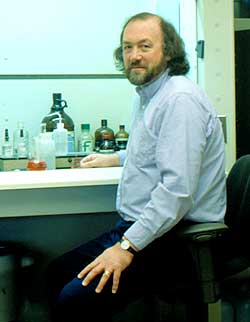 |
QUICK SEARCH
MO PROJECTS:
Africa
Asia/Pacific
Mesoamerica
North America
South America
General Taxonomy
Photo Essays
Training in Latin
America
MO RESEARCH:
Wm. L. Brown Center
Bryology
GIS
Graduate Studies
Research Experiences
for Undergraduates
Imaging Lab
Library
MBG Press
Publications
Climate Change
Catalog Fossil Plants
MO DATABASES:
W³MOST
Image Index
Rare Books
Angiosperm
Phylogeny
Res Botanica
All Databases
INFORMATION:
What's New?
People at MO
Visitor's Guide
Herbarium
Jobs & Fellowships
Symposium
Research Links
Site Map
Search
 | table of contents |
PROFILE: P. Mick Richardson | |
 |
Like many Garden curators, Mick Richardson teaches botany at the undergraduate and graduate level. He is an adjunct professor at University of Missouri - St. Louis, where he teaches an annual course in plant systematics. He is a biochemist and is currently studying the evolution of toxic substances in land plants.
Photo: Trent Foltz |
New FrontiersRichardson helps select the candidates and arranges the financial support graduate students need for classroom, lab and field studies. He also serves as academic mentor, colleague and, often, one-man support group. Mostly, though, Richardson sees his role as a player in a much larger mission - to educate the next generation of botanists and to develop botanical expertise in countries where biodiversity is threatened. "Most people don't realize that the scientific community is at risk of losing parts of the botanical knowledge base established by previous generation." says Richardson. "Many experts around the world worked alone or didn't publish extensively. They didn't pass along their expertise on a person-to-person level. And when they are gone, their years of observational judgment may go with them. Our graduate program aims at preventing that from happening in the future." So Richardson is on a continuing quest to identify and support talented students with the potential to become exceptional scientists. More often, though, they find him, knowing that the Garden offers a unique combination of superb academics, research facilities, and opportunities for field work almost anywhere in the world. "There's a thrill in seeing our graduate students grow," say Richardson. "You see them catch fire. You see their inner drive, their willingness to work long hours in the field and in the herbarium, just for the sake of learning. I take great satisfaction in knowing that the opportunities we provide will help students - and their countries - make contributions that will not only sustain knowledge, but also push new frontiers." | |
| Text and photos from "The Unseen Garden" available from MBG Press. | |
© 1995-2025 Missouri Botanical Garden, All Rights Reserved
4344 Shaw Blvd.
St. Louis, MO 63110
(314) 577-5100
Technical Support